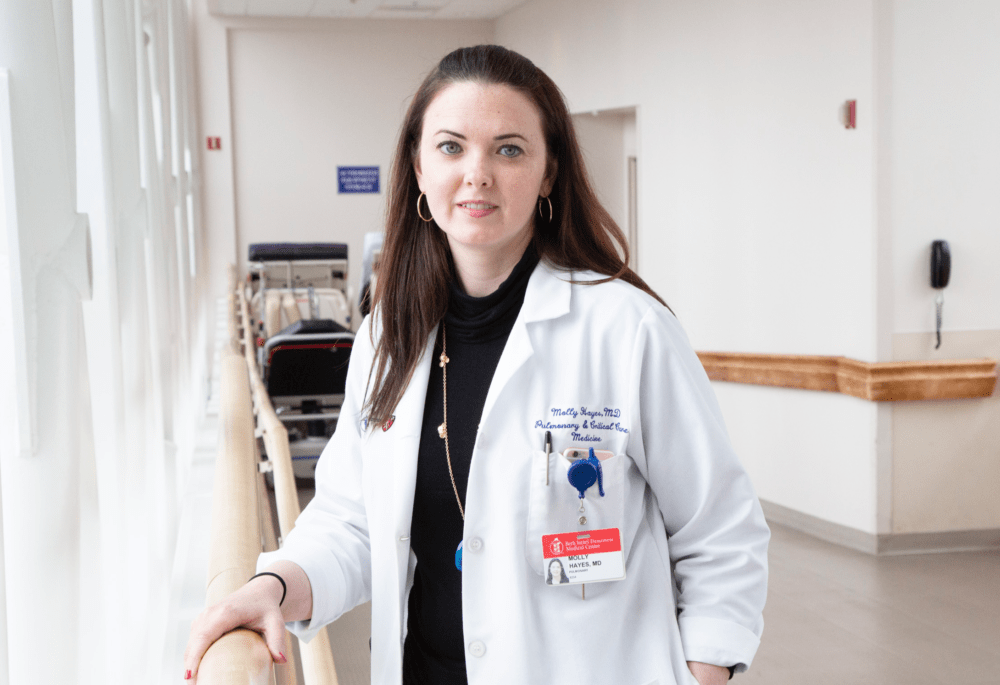Advertisement
Hospital Dispatch
Boston Doctor's Up-Close View Of COVID-19: It Can Get Bad Fast, Last Long, And Hit The Young
Resume
Dr. Molly Hayes is quickly coming to know personally some of the key hallmarks of COVID-19: It can turn severe fast. When it does, patients often need a ventilator for more than a week. And it’s not only older people who get seriously ill.
"I think what we're seeing in Boston is that it's actually younger people who are getting sick," said Hayes, a lung specialist who directs the medical intensive care unit at Beth Israel Deaconess Medical Center. "The reports from other countries were that this was happening mostly to older people who had illnesses to begin with. But we are seeing in Boston that this is happening to younger people who don't really have any predisposing illnesses like cardiac disease or cancers."
As coronavirus cases in Massachusetts increase, the hospital chain Beth Israel Lahey Health is carrying one of the heavier loads of inpatient care. As of Thursday it reported more than 300 patients with confirmed or presumed coronavirus, including 56 in intensive care.
A central danger in COVID-9 is that a patient’s lungs get so badly damaged that they can’t function well, a syndrome called Acute Respiratory Distress Syndrome that also occurs in flu and other illnesses.
When patients can’t breathe on their own anymore, they need mechanical help from a machine called a ventilator or a respirator, "and what we're actually seeing is that patients are so sick that they need to be on respirators for a week or more," Hayes said.
That’s long — ideally patients get better enough to breathe on their own in a day or two, but COVID-19 patients often need intensive care beds for much longer.
It takes a lot of people to safely turn a critically ill patient from their back onto their stomach.
And things can go bad fast, Dr. Hayes said. A patient might be getting just a little oxygen through the nose, and then suddenly their oxygen levels drop so precipitously they need to be intubated and put on mechanical ventilation.
"And that whole process can happen in the span of a couple hours," she said. "So we are seeing sort of this rapid decline, and this is something that we have been told about from some of the doctors in China as well."
Only about 5% of COVID-19 patients end up needing intensive care, Hayes said, but the lung danger is why people who are sick need to especially watch out for chest pain and unusual shortness of breath.
It can manifest in different ways — and of course your doctor knows best — but if a patient is huffing and puffing, or so short of breath it's hard to get out a full sentence, "That would be something that is very concerning," she said.
For patients with severe cases, ventilators offer "supportive" — rather than curative — treatment, and Hayes said using a ventilator optimally is a complex science that her Beth Israel Deaconess colleagues and others have studied extensively.
Inhaled drugs can be added to the oxygen to improve how blood flows in the lungs. Another technique is called proning — that is, turning patients over from their backs to "prone" on their stomachs, which affects blood flow through the lungs and can raise oxygen levels.
"As you might imagine, it takes a village, truly, to prone a patient in the intensive care unit," she said. "It takes a lot of people to safely turn a critically ill patient from their back onto their stomach. They have a lot of tubes in them, a tube in their windpipe that's connected to the ventilator and other tubes in their arteries and veins."
But it can help. Hayes said word came from colleagues in China and Italy that proning is useful for the coronavirus. And her message for younger Bostonians is not to think they’re immune from the coronavirus — she and colleagues throughout Boston are seeing severe illness in younger patients as well.
This segment aired on March 26, 2020.
